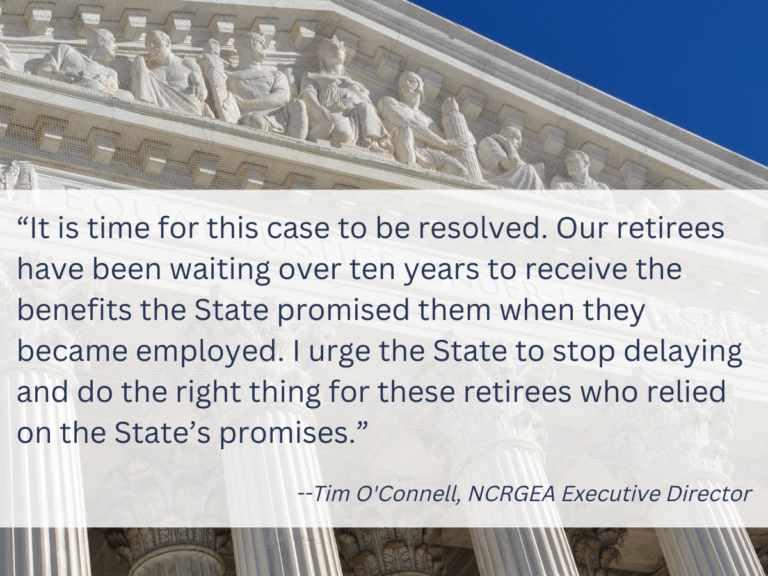The North Carolina Retired Governmental Employees’ Association opposes Senate Bill 743
NCRGEA opposes Senate Bill 743.
NCRGEA opposes Senate Bill 743.
By Tim O’Connell, Executive Director of North Carolina Retired Governmental Employees’ Association | March 30, 2023
On behalf of our association’s close to 66,000 members, we want to thank the efforts of both the executive branch and our House legislative leadership for including a 2 percent recurring cost of living adjustment for state government retirees and retired educators. If fully approved, the recurring adjustment will be distributed one percent per biennium year. Government retirees are the unsung heroes of our North Carolina, building a state that remains prosperous, safe, clean, and desirable for families to lead healthy, high-quality lives.
Today, the State House of the North Carolina General Assembly released its anticipated budget, an almost $30 billion budget providing raises for active state government employees and educators and rainy day funds to protect against our challenging, unbridled current inflationary economic environment.
While we have made tremendous progress, we at the NCRGEA will continue to fight for these dedicated women and men, both our local and state government retirees and stay a resource for executive and legislative leadership in providing this most critical relief.
Our elected officials recognized the plight of retirees and have also provided raises to help our future retirees have a better quality of life in retirement.
NCRGEA Partners with FastDemocracy
In an exciting new development, NCRGEA has partnered with FastDemocracy to offer members the ability to follow the Association’s advocacy efforts and what is happening in the North Carolina legislature. Pensions, retiree healthcare, broadband — any issue that is a priority to our members will be tracked and then shared on our website for you to see.

Both pages are located under the Advocacy section in the NCRGEA website‘s dropdown menu.
NCRGEA is committed to representing its members and empowering them with the tools needed to advocate effectively for their retirement needs. We will continue to explore technology and any other tools needed to bring us all together in pursuit of a common goal — protecting you in retirement after a lifetime of dedicated public service.
Raleigh, October 20, 2022 — Tim O’Connell, Executive Director of the North Carolina Retired Governmental Employees’ Association, announced today that the United States Supreme Court has denied the Petition filed by the State of North Carolina seeking review of the North Carolina Supreme Court decision affirming a partial judgment in favor of retired State employees seeking promised health care benefits.
This past March, the NC Supreme Court ruled that a vested State retiree is contractually entitled to the same retiree health care benefits that were in place at the time they vested. The NC Supreme Court ruling sends the case back to the North Carolina Superior Court for a determination of whether the State’s actions in reducing benefits was a material breach of the contract and if so, a determination of damages.
“It is time for this case to be resolved,” O’Connell stated. “Our retirees have been waiting over ten years to receive the benefits the State promised them when they became employed. I urge the State to stop delaying and do the right thing for these retirees who relied on the State’s promises.”

The case was filed in Gaston Superior Court in 2012 after the North Carolina General Assembly reduced the benefits retirees would receive in the nonpremium contributory plan. The Superior Court granted a partial summary judgment for the retirees and reserved ruling on the amount of damages.
“This case has been up and down in the trial court and appellate courts for almost 11 years,” stated Chris Whelchel of the Gastonia law firm Gray, Layton, Kersh, Solomon, Furr and Smith, one of counsel for the retirees. “We are prepared to move on with this case to make sure these retirees receive what the courts have said they deserve. Many of the 220,000 retirees affected by this case have died waiting for justice to be served.”
At the November district conferences, lobbyist Jack Cozort shared information on the case with members. You may view it below.
We know that many members of the Association remain interested in the Lake Case and its related current developments.
Here is a condensed history of the case: In 2011, the General Assembly reduced the standard health plan for State retirees from a noncontributory 80/20 plan to a 70/30. Twenty-eight retirees, led by former Supreme Court Chief Justice I. Beverly Lake, Jr., filed suit in 2012 to preserve and protect state retirees’ health care benefits.
Over the last ten years, the State of North Carolina asserted a variety of procedural and substantive defenses to test the merits of the case. In 2016, the Superior Court Judge presiding over the case certified the case as a class action, affecting some 220,000 state retirees who had vested benefits as of 2011.
The Superior Court Judge ruled that the plaintiff retirees were entitled to judgment against the State. The Judge’s Order specified that damages would be assessed after hearing expert witness evidence.
The State appealed, and a cumbersome appellate process ensued. In October of 2021, the case finally was heard in the North Carolina Supreme Court for a decision on the merits of the case. On March 11 of this year, the Supreme Court held that state retirees do have enforceable contract rights. The Court held that each retiree in the
class is entitled for life to the noncontributory health care benefits offered by the state at the time that retiree vested in retirement health care benefits. Those benefits are a part of that retiree’s contract with the State.
The Supreme Court sent the case back to the Superior Court for a determination of how much in damages each retiree should receive. In other words, what are the extra costs each incurred as a result of the 2011 action of the General Assembly?
Each side will hire experts, actuaries, to determine what those damages are and present evidence to the Superior Court. It will take several months for any more specific information to be available from the Superior Court. It should be stressed that this case covers only State government retirees, not local government.
On June 9, 2022, the State of North Carolina filed a petition for Writ of Certiorari with the United States Supreme Court requesting that the U. S. Supreme Court consider an appeal of the North Carolina Supreme Court’s decision. The Plaintiffs’ response is due on August 15, 2022.
This week, the legislative leadership rolled out a comprehensive budget addressing many current and anticipated matters, including recession and employee recruitment and retention. While doing so; however, the budget failed to support both active and retired government employees as had been hoped.
Retirees will receive an additional 1 percent bonus to an already scheduled 3 percent bonus this October. In all, retirees will receive a 6 percent bonus for the two-year 2021-2023 biennium, having received a 2 percent bonus in 2021, and 4 percent this fall.
This past January, local government retirees, who are typically not included in general fund appropriations, receive a 2 percent bonus from LGERS Board of Directors, to be distributed as required by law in October 2022. Investment returns from the local government retirement system funded the bonus.
“I’d like to thank our legislative leadership for the grueling work they’ve done to create the budget,” said NCRGEA Executive Director Tim O’Connell. “It’s clear to me, though, that our legislative leadership remains somewhat deafened to the needs of retirees. While we recognize the impact 6 percent in bonus money has and will have on retirees – and it’s a positive impact – we have yet to make up for the years of pension value loss retirees have suffered since the Great Recession.
“While we will continue to fight for our retirees, we do indeed recognize and thank legislative leadership for providing the largest bonus money seen in many years, and one of the largest in the United States. But we have more work to do.”
No budget sails smoothly, and this year’s budget may experience some bumps in the days to come. House Minority Leader Robert Reives said, “I think it’s going to be a fight,” while others are calling on Gov. Roy Cooper to veto the non-amendable conference report.
State Treasurer Dale Folwell praised the bonus and efforts by the General Assembly to provide additional money for retirees. “They’ve fully funded the pension plan and the state health plan, and given retirees one of the biggest bonuses in years. And paid for it.” (Will Doran, News and Observer).
Active employees will see increases starting July 1, with additional boosts from last year’s long session raises of 2.5 percent. In all, active TSERS will receive a 3.5 percent increase in pay. The average teacher pay increase will be 4.2 percent, with additional incentive bonus pay for teachers in underserved counties.
When questioned during the press conference yesterday by reporters, Senate President Pro Tem Phil Berger said the budget, “was the right budget for North Carolina at this time.” Leaders said that the 2022 budget was built to help the state weather current and predicted economic trends and also provide needed infrastructure improvements in state government facilities, water and sewer, as well as the sale of several exhausted properties.
Staff and consultants for NCRGEA will continue to study the budget very closely for any additional items of interest to retirees.
You can find the bill of text of state budget here: H103-PCCS20003-MLXR-9 (ncleg.gov)
“As the Court stated, ‘These employees reasonably relied on the promise of this benefit in choosing to accept employment with the State. They are entitled to the benefit of their bargain, which includes eligibility to enroll in a premium-free plan offering the same or greater coverage value as the one available to them when their rights vested.’”
“This decision has been a long time in coming. We are grateful to the attorneys, led by Christopher Whelchel and Michael Carpenter at the Gray Layton Kersh firm in Gastonia, with great assistance from attorneys Sam McGee and Gary Jackson, who have worked so hard for so long to protect retirees’ rights. We are also grateful to AARP and the North Carolina Association of Educators for their support.”
“We agree with the Court’s determination that this dispute raises issues of profound importance to the hundreds of thousands of dedicated public employees who devoted their lives to serving their fellow North Carolinians, often for far less immediate remuneration than would have been available to them in the private sector.”
The Lake Case court decision may be viewed on the North Carolina Judicial Branch website.
